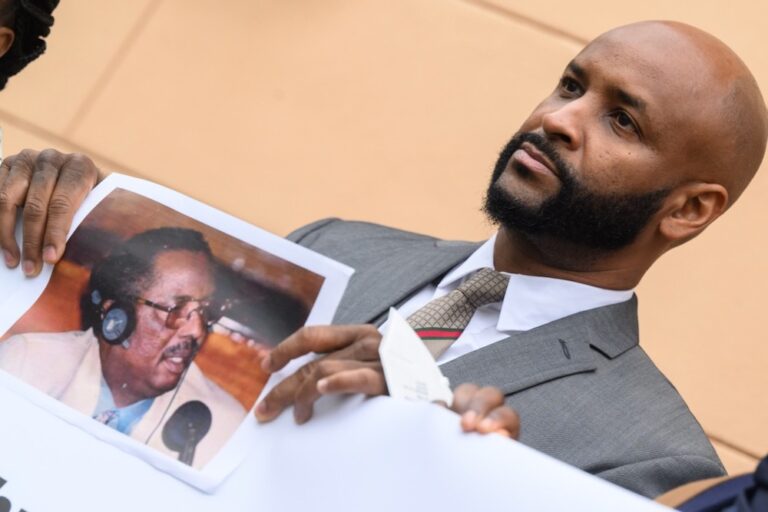(CPJ/IFEX) – The following is a 17 June 1999 CPJ letter addressed to the President of Gambia: **Updates IFEX alerts of 17 June 1999. For further background information, see IFEX alerts of 19 May, 20 April, 3 March, 19 February, 13 February and 9 February 1998** President Yahya A.J.J. Jammeh State House Banjul The Gambia […]
(CPJ/IFEX) – The following is a 17 June 1999 CPJ letter addressed to the
President of Gambia:
**Updates IFEX alerts of 17 June 1999. For further background information,
see IFEX alerts of 19 May, 20 April, 3 March, 19 February, 13 February and 9
February 1998**
President Yahya A.J.J. Jammeh
State House
Banjul
The Gambia
Your Excellency:
As Africa Program Coordinator for the New York-based Committee to Protect
Journalists (CPJ), I would like to take this opportunity to alert Your
Excellency to issues of particular concern to our organization in The
Gambia. Having attended the conference of the West African Journalists’
Association (WAJA), which closed its deliberations in Banjul today, I have
also been able to benefit from opinions and concerns expressed by our
various colleagues here.
One issue that is of deep concern to CPJ, and to the majority of delegates
attending this conference, is the continued closure of the independent
Citizen FM radio station in Banjul, which has been off-air since the arrest
and brief detention of two key members of its staff in February 1998, and
the forfeiture of its radio equipment to the government.
This case is of particular concern to CPJ because of the wide range of
repressive legislation that continues to hamper the proper functioning of
the independent media in The Gambia, despite promises made by your
government to move towards true democracy following the 1996 presidential
elections.
Such repressive legislation includes the 1996 Newspaper Decrees #70 and #71,
that enacted exorbitant fines for any contravention of the 1994 Newspaper
Act, which criminalises the failure of independent publications to register
annually with the government, and increased the registration bond for
existing newspapers by 100%. State-owned publications are not subject to
these decrees.
CPJ recognizes that Your Excellency’s government has promised to give high
priority to media development in The Gambia, and we welcome the current
efforts to formulate a National Communication and Information Policy
(NACIP). However, we also agree with the analysis offered by the
London-based freedom of expression organization, Article 19, in its
memorandum to your government, in that the policy does not go far enough to
guarantee the independence of public broadcasting and freedom of
information.
The Citizen FM case began on February 6, 1998, when National Intelligence
Agency (NIA) agents arrested Baboucar Gaye and Ebrima Sillah, the proprietor
and news editor, respectively, of the radio station. They were arrested in
connection with a report on Citizen FM concerning the firing of NIA’s
director of operations for his involvement in a counterfeiting scandal. The
Department of State of Works and Communications later described the report
as “not palatable, deceptive, and irresponsible”. The day after the arrests
took place, NIA officials and armed soldiers sealed off the Citizen FM
offices, which are shared by the New Citizen newspaper, and ordered all
staff members to leave the premises, forcing the station off air and New
Citizen to stop publishing.
Gaye was eventually found guilty, in the magistrates’ court, of operating a
radio station without a license under the 1913 Telegraphic Stations Act. He
was fined and ordered to transfer all of Citizen FM’s broadcast equipment to
the state. Gaye’s appeal to the High Court opened on April 30, 1999, but was
immediately deferred until June 14. The appeal hearing has now been set for
July 2. Citizen FM meanwhile remains closed and off-air.
CPJ is also concerned by the sacking on June 6, 1999, of Demba Jawo and
Theophilus George, news editor and deputy managing director, respectively,
of the independent Daily Observer newspaper. The sackings followed the
purchase of the newspaper by Amadou Samba, a businessman who is reported to
be close to the government. During the current WAJA conference, in Banjul,
numerous journalists told CPJ that they feared this action was part of a
deliberate government strategy to further muzzle the independent press in
The Gambia.
As a non-partisan organization committed to the defense of our colleagues
worldwide, CPJ respectfully reminds you that the right to seek, receive and
impart information is guaranteed under Article 19 of the Universal
Declaration of Human Rights, Article 19 of the International Covenant on
Civil and Political Rights, and Article 9 of the African Charter on Human
and People’s Rights, to all of which The Gambia is a signatory. We therefore
urge Your Excellency to allow Citizen FM to resume broadcasting immediately
and return all forfeited equipment; to repeal or amend military decrees and
other legislation that are not in line with international standards; and to
ensure that all journalists in The Gambia are free to practise their
profession freely, without fear of harassment.
We would very much welcome your comments on these matters.
Yours sincerely,
Claudia McElroy
Africa Program Coordinator
Recommended Action
Similar appeals can be sent to:
Appeals To
President Yahya A.J.J. Jammeh
State House
Banjul
The Gambia
Fax: +220 227 034
Please copy appeals to the source if possible.


